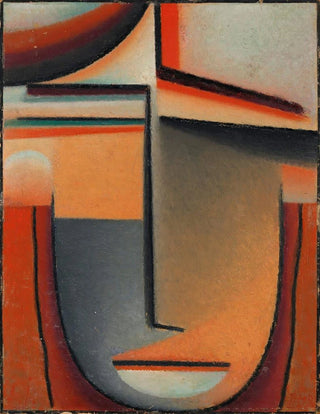Art print | Tragic Abstract Head - Alexej von Jawlensky


View from behind

Frame (optional)
In the vast panorama of modern art, "Tête abstraite tragique" by Alexej von Jawlensky stands out for its emotional intensity and deep introspection. This artwork, which evokes feelings of melancholy and contemplation, immerses us in a universe where abstraction meets expressionism. The canvas, both striking and disorienting, invites viewers to reflect on the nature of human identity and the torments of the soul. By examining this creation, one discovers an artistic dimension that transcends mere visuals to touch the very essence of being.
Style and uniqueness of the work
The strength of "Tête abstraite tragique" lies in its unique style, characterized by simplified forms and vibrant colors. Jawlensky, a master of abstraction, uses lines and hues to express profound emotions rather than represent reality figuratively. Geometric shapes, almost stylized, evoke a human figure, while warm and cool tones blend to create a striking contrast. This duality in the use of colors reflects the complexity of human emotions, making each viewing of the work a new experience. The artist thus manages to capture the tragic essence of the human condition, offering viewers a window into their own inner reflections.
The artist and his influence
Alexej von Jawlensky, an emblematic figure of the expressionist movement, made his mark on his era with a bold approach to color and form. Born in Russia, he was influenced by his cultural roots while integrating European artistic currents of his time. Jawlensky often explored themes of spirituality and psychology, seeking to translate the invisible through his art. His work has inspired many contemporary and later artists, contributing to the redefinition of the boundaries of modern art. "Tête abstraite tragique" is a striking example of this artistic quest, where abstraction becomes a means of personal and universal expression, touching entire generations.
An exceptional wall decoration signed Artem Legrand
The art print Tête abstra

Matte finish

View from behind

Frame (optional)
In the vast panorama of modern art, "Tête abstraite tragique" by Alexej von Jawlensky stands out for its emotional intensity and deep introspection. This artwork, which evokes feelings of melancholy and contemplation, immerses us in a universe where abstraction meets expressionism. The canvas, both striking and disorienting, invites viewers to reflect on the nature of human identity and the torments of the soul. By examining this creation, one discovers an artistic dimension that transcends mere visuals to touch the very essence of being.
Style and uniqueness of the work
The strength of "Tête abstraite tragique" lies in its unique style, characterized by simplified forms and vibrant colors. Jawlensky, a master of abstraction, uses lines and hues to express profound emotions rather than represent reality figuratively. Geometric shapes, almost stylized, evoke a human figure, while warm and cool tones blend to create a striking contrast. This duality in the use of colors reflects the complexity of human emotions, making each viewing of the work a new experience. The artist thus manages to capture the tragic essence of the human condition, offering viewers a window into their own inner reflections.
The artist and his influence
Alexej von Jawlensky, an emblematic figure of the expressionist movement, made his mark on his era with a bold approach to color and form. Born in Russia, he was influenced by his cultural roots while integrating European artistic currents of his time. Jawlensky often explored themes of spirituality and psychology, seeking to translate the invisible through his art. His work has inspired many contemporary and later artists, contributing to the redefinition of the boundaries of modern art. "Tête abstraite tragique" is a striking example of this artistic quest, where abstraction becomes a means of personal and universal expression, touching entire generations.
An exceptional wall decoration signed Artem Legrand
The art print Tête abstra






